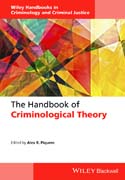
An indispensable resource for all levels, this handbook provides up–to–date, in–depth summaries of the most important theories in criminology. Provides original, cutting–edge, and in–depth summaries of the most important theories in criminology Covers the origins and assumptions behind each theory, explores current debates and research, points out knowledge gaps, and offers directions for future research Encompasses theory, research, policy, and practice, with recommendations for further reading at the end of each essay Features discussions of broad issues and topics related to the field, such as the correlates of crime, testing theory, policy, and prediction Clearly and accessibly written by leading scholars in the field as well as up–and–coming scholars INDICE: 1. Introduction – Theory and Contemporary CriminologyCharles R. Tittle2. Correlates of CrimeMatt DeLisi and Michael G. Vaughn3. Theory Testing in CriminologyTravis C. Pratt4. DeterrenceTom Loughran, Ray Paternoster, and Douglas B. Weiss5. Contemporary Biosocial Criminology: A Systematic Review of the Literature, 2000–2012J.C. Barnes, Brian B. Boutwell, and Kevin M. Beaver6. A Developmental Perspective on Adolescent Risk–Taking and Criminal BehaviorElizabeth Cauffman, Caitlin Cavanagh, Sachiko Donley, and April Thomas7. Social Disorganization Theory s Greatest Challenge: Linking Structural Characteristics to Crime in Socially Disorganized CommunitiesCharis E. Kubrin and James Wo8. Routine Activities, Delinquency, and Youth ConvergencesJose R. Agustina and Marcus Felson9. Environmental CriminologyAiden Sidebottom and Richard Wortley10. Control as an Explanation of Crime and DelinquencyChester L. Britt and Michael Rocque11. Strain, Economic Status, and CrimeRobert Agnew12. Social Learning TheoryRonald L. Akers and Wesley G. Jennings13. Cultural Processes, Social Order, and CriminologyMark T. Berg, Eric A. Sevell, and Eric A. Stewart14. Labeling Theory: Past, Present, and FutureRuth Triplett and Lindsey Upton15. Feminist TheoryJoanne Belknap16. Critical CriminologyMartin D. Schwartz and Henry H. Brownstein17. Integrating Criminological TheoriesMarv Krohn and Jeffery T. Ward18. Developmental and Life–Course Theories of CrimeTara R. McGee and David P. Farrington19. Biosocial Bases of Antisocial and Criminal BehaviorFrances R. Chen, Yu Gao, Andrea Glenn, Sharon Niv, Jill Portnoy, Robert Schug, YalingYang, and Adrian Raine20. From Theory to Policy and Back AgainScott H. Decker21. How Do Criminologists Interpret Statistical Explanation of Crime? A Review of Quantitative Modeling in Published StudiesDavid Weisburd, Breanne Cave, and Alex R. Piquero22. Situational Theory: The Importance of Interactions and Action Mechanisms in the Explanation of CrimePer–Olof H. Wikström and Kyle Treiber23. Macro–Level Theory: A Critical Component of Criminological ExplorationEric P. Baumer and Ashley N. Arnio24. What International Research Has Told Us About Criminological TheoryOlena Antonaccio and Ekaterina V. Botchkovar25. Qualitative Criminology s Contributions of TheoryAndy Hochstetler and Heith Copes
- ISBN: 978-1-118-51238-8
- Editorial: John Wiley & Sons
- Encuadernacion: Cartoné
- Páginas: 560
- Fecha Publicación: 08/09/2015
- Nº Volúmenes: 1
- Idioma: Inglés
